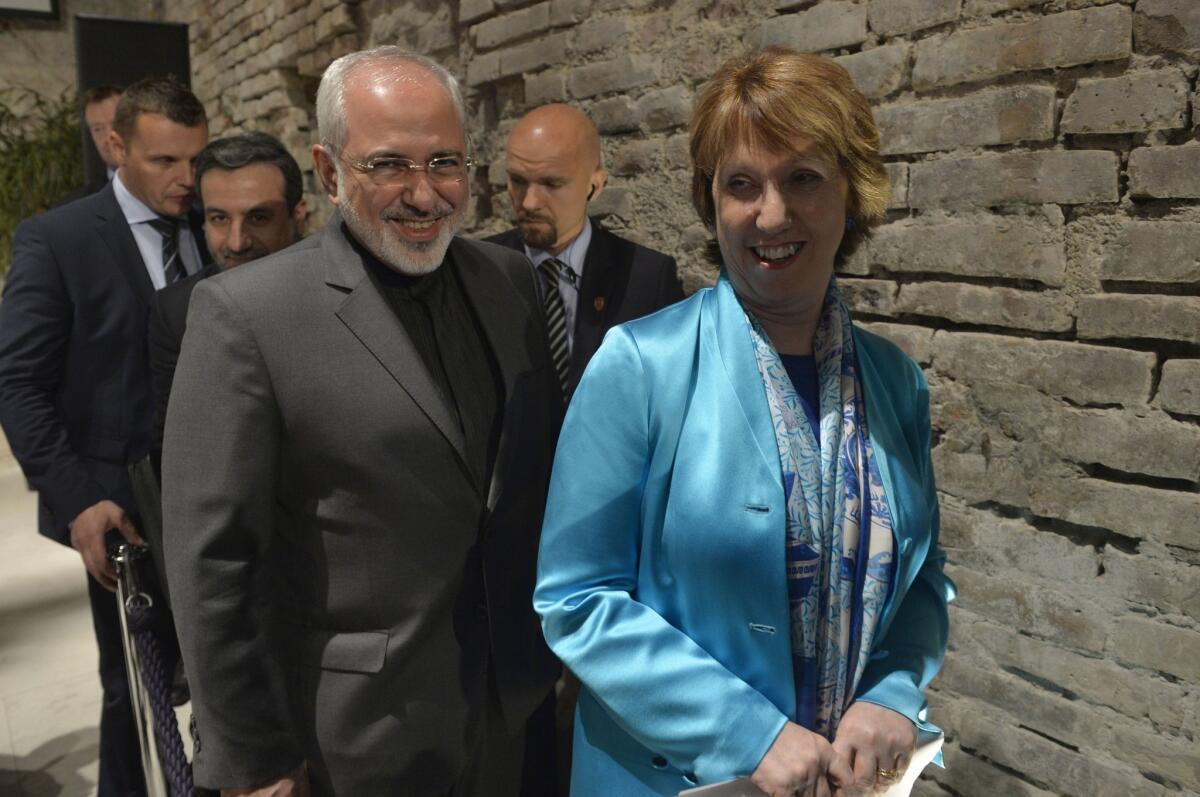Missed deadline on Iran nuclear talks sparks a blame game

- Share via
Reporting from Tehran — The latest snag in negotiations over Iran’s nuclear program has set off a round of finger-pointing between the country’s hard-liners and reformists.
Though Iranian officials insist that the failure of negotiators to produce a deal by the original July 20 deadline isn’t a serious setback, it means that talks will drag on until November, and that any easing of the sanctions that have been damaging Iran’s economy are further off than many Iranians had hoped.
Since the deadline extension was announced Friday, Iranian reformists and hard-liners have blamed the impasse on the United States, its European allies, Israel — and each other.
Iran and six world powers — the U.S., France, Britain, Germany, Russia and China — have been trying to work out a deal to ensure that Iran’s nuclear program remains peaceful. The deal would reward Iran for limiting its nuclear activities by lifting sanctions on it.
Hussein Sheikholeslam, a senior advisor to parliamentary speaker Ali Larijani, said in an interview that the impasse in negotiations was caused by Israel’s pressure on the U.S., France and Britain not to make a deal.
Though the Iranian team had been intent on getting an agreement by the deadline, “the Israelis are pushing from behind,” he said.
The spokesman held out hope that Iran could complete a deal by November, opening the way for an expansion of the country’s power-generation capacity.
Alaeddin Boroujerdi, head of the parliament’s foreign policy commission, said American greed caused the delay and vowed that Iran wouldn’t give in to U.S. demands.
In an interview with the Fars news agency, he said Iranian negotiators warned U.S. officials during the talks that if no deal was reached, Iran would quickly resume production of uranium enriched to 20% purity, which worries the West because such uranium can be easily converted to bomb fuel. Iran would also activate the partially built Arak heavy-water reactor, which is designed to produce plutonium, another potential nuclear bomb fuel, Boroujerdi said.
“We hope America stops being greedy,” he said.
The reformist newspaper Ebtekar noted that some hard-liners were pointing to the delay as a sign of the government’s mishandling of the nuclear issue. But it said in an editorial that hard-liners now criticizing the government were applauding long, inconclusive talks two years ago when they were guided by fellow hard-liner Saeed Jalili. It argued that the team led by President Hassan Rouhani had succeeded in getting the six powers to negotiate seriously with Iran.
Fars, which has connections to Iran’s powerful Revolutionary Guard, said in an editorial that the delay showed that Iran had not compromised on the key issue of its uranium enrichment capacity, nor on demands that sanctions be lifted quickly and permanently.
Hamid Reza Taraghi of the Islamic Coalition Party, who has close ties Iranian supreme leader Ayatollah Ali Khamenei, said U.S. procrastination was the cause of the delay and said Iranians should be prepared to get by without a deal.
“We have to be self-reliant and assume the sanctions are forever,” he said in an interview.
Some Iranians, who have been living with tough sanctions for years, shrugged off the delay.
Mohammad Ayyobi, a teacher of classical music and a magazine publisher, said at his shop that Iran’s economic situation won’t worsen during the four-month delay.
“Let’s see how future events unfold,” he said.
Ali Sabzevari, an advertising advisor and supporter of Rouhani, said the extension was “better than nothing.”
“At least for four months, we can have a job and survive,” he said.
Mostaghim is a special correspondent. Times staff writer Paul Richter in Vienna contributed to this report.
More to Read
Sign up for Essential California
The most important California stories and recommendations in your inbox every morning.
You may occasionally receive promotional content from the Los Angeles Times.













